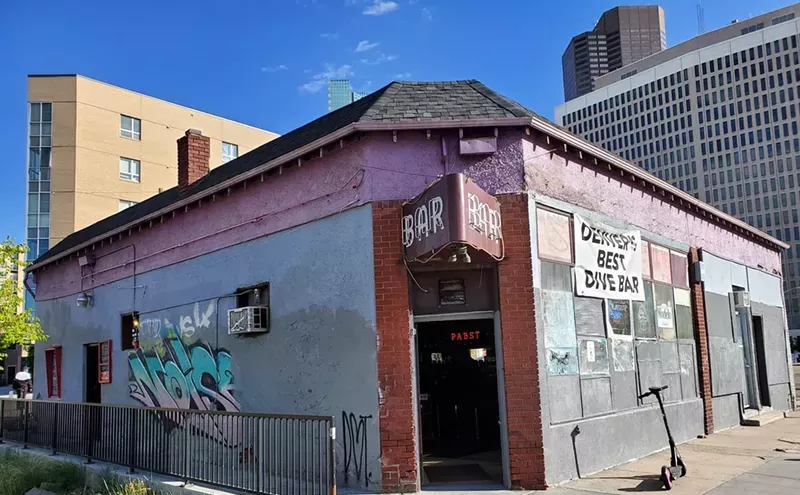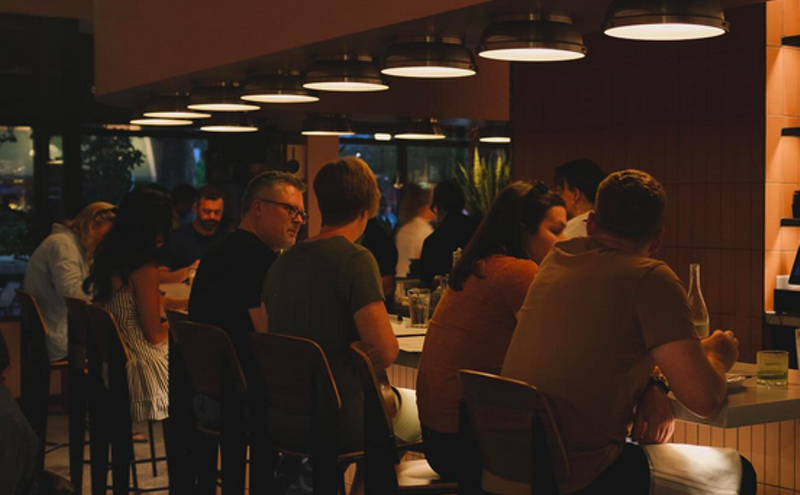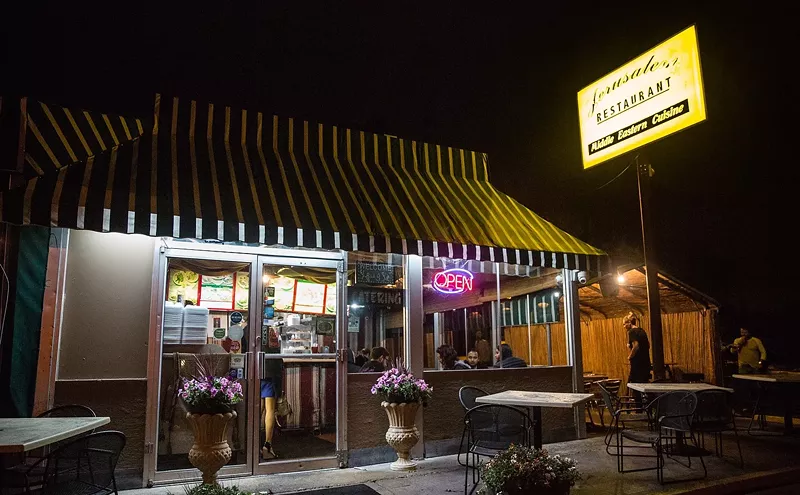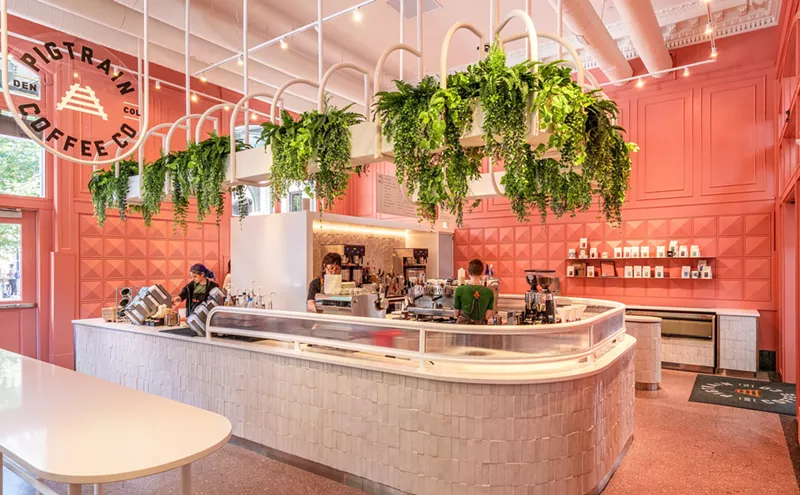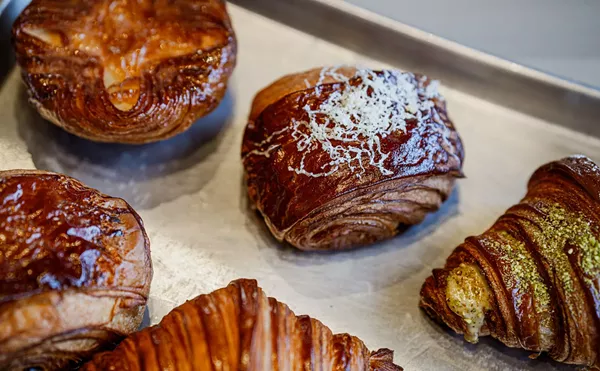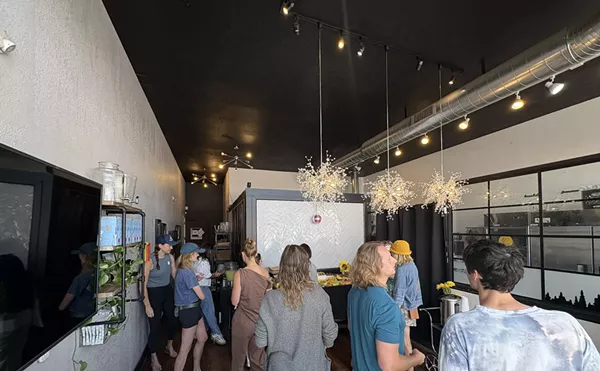No, give me some calamitous tale of risks taken, fortunes made and fortunes lost any day. Something with a little meat on it. And if it comes ready-made with a neat and tidy Hollywood-style redemptive denouement? All the better.
So here's the tale of Steele Platt -- a local boy with an unlikely name made good, gone bad and made good again. Platt, a graduate of the University of Denver's hotel and restaurant program in the early '80s, could have been a poster boy for his alma mater, the kind of guy they put in recruiting pamphlets. After finishing off his degree, he spent some time waiting tables around town, bounced around the local haunts and in 1985 made his first stab at being a restaurateur by opening the Polynesian-themed Kailua's (named after the town in Hawaii where he grew up) in the old Tivoli brewery on the Auraria campus. After Kailua's came the Boiler Room, also in the Tivoli, which was famous for its college crowds and three-foot-tall, narrow beer glasses, called "yards" (a detail that'll be important later); a vintage diner across from the Boiler Room called Oinks; and the nightclub EFEX, downstairs in the Tivoli. There were other joints in other places, too -- other restaurants and bars with Platt's name on the dotted line -- and soon this guy was It with a capital I. He liked the nightlife; he liked to boogie, and he had visions of expanding outside Colorado, franchising the Boiler Room concept, taking over the world one college town at a time.
That was around 1988. Platt was a millionaire, a club owner, a restaurateur -- and not yet thirty.
A couple of years later, he was gone.
The stories surrounding his rather abrupt exodus from Denver border on movie-of-the-week sensational. There were lawsuits filed by the group that had bought the Boiler Room from him -- a 200 percent profit deal that gave him the capital necessary to open EFEX. Then there were complaints from the people at Morton's of Chicago (another Tivoli resident at the time) about the noise from EFEX once it did open, and rumors of vendors stiffed and rents unpaid. By the time Platt landed in California in the early '90s, he'd sold or closed all of his properties in Denver and was looking for a new start. That's what people do in California: start over. And Platt started over from the bottom. He filed Chapter 7, tended bar and sold cars to pay the rent, and bided his time.
In 1995, Platt wandered into an abandoned restaurant on the Long Beach waterfront and thought maybe the time was right to try again. Not the kind of guy with small dreams, he had an idea for making the world's largest draft-beer system. He had a business plan sketched out on a stack of cocktail napkins and plans for expansion before he even had his first place open.
And wisely, this time he had a partner: Steve Reynolds, whom Platt had met in Denver when Reynolds was a liquor distributor working with Kailua's, then ran into again in Southern California. Together they attracted some investors, found themselves a property and in 1996 -- at the height of the microbrew craze -- opened their first Yard House in Long Beach, using a "Son of Boiler Room" concept. Platt brought back the yard glasses, installed his draft-beer system and filled the place with good tunes -- but the menu was weak. By the end of their first year in business Platt and Reynolds knew they had a winning concept, but they were losing customers who weren't excited about the pub grub being banged out by the shoemakers in the kitchen. Now, a normal bar owner might have done something simple like yanking the jalapeño poppers off the board, adding truffles and frisée to every plate, or -- worse -- calling in the consultants. But Platt, true to form, aimed higher and hired Carlito Jocson, an award-winning Orange County chef and former biochemist, as executive chef, to upgrade the food at Yard House and oversee a new "American fusion" menu.
It worked. By the end of 2000, Platt and company had three restaurants in California and annual earnings topping $20 million.
By 2002, there were a half-dozen Yard Houses with a gross of $30 million.
And now, in 2003, with earnings projected at somewhere around the $50 million mark, Platt is back in Denver with a brand-spanking-new Yard House that opened early this month at Colorado Mills. It has 130 beers on tap (compared with 250 in Long Beach, but still requiring enough stainless-steel tubing running from the keg room, through the cooling machinery and out to the taps to build three cars), seating for almost 550 people and an extensive menu created by Jocson and executed locally by Jose Herdato, formerly of Papillon and Tommy Tsunami's.
So the prodigal son has returned. He's a little older, a whole lot wiser, and this time, it looks like he means to stay.
But wait, there's more: Just ten days before the private grand-opening/homecoming bash for Platt and his Lakewood Yard House, the Boiler Room -- the place where he really hit it big -- closed for good. On July 17, a three-day notice to vacate was posted on the establishment's front door, stating that it had failed to pay $11,812 in rent for the month of July.
The Boiler Room had seen a lot of changes since the first Platt era. After some disastrous years as an independent dining destination (besides Morton's, restaurant tenants included the first incarnation of Zenith, the Rattlesnake Grill and the Viceroy), the Tivoli had turned into the student union for the three colleges on the Auraria campus. But the Boiler Room just kept serving draft beers and chicken wings to fifteen years' worth of sports fans and procrastinating students -- and then, right before Platt returned to town, it closed down. Weird, huh?
At the moment, there are no concrete plans for filling the space left vacant by the Boiler Room. Because of its location on campus, any potential tenants will have to go through a public bid-and-proposal process with the Student Advisory Committee to the Auraria Board, which will then choose one bidder to present to Tivoli management. And while the location seems like a sure bet for any up-and-coming bar tycoon (talk about positioning -- you'd be surrounded every day by your target clientele), for the foreseeable future, the space will remain dark, and students will just have to find some other place to get shnockered this fall.
Leftovers: The Yard House isn't the only new place in town with a little back-story. Remember the big deal made a few months ago over Oran Feild, the London-born cook-turned-barman tending the taps and mixing drinks at Flow in the then-new Luna Hotel (1612 Wazee Street)? Well, Feild is now at the just-opened Brasserie Rouge (1801 Wynkoop Street), pouring his custom cocktails and weird liquor infusions for a fresh crop of customers.
And there's a new Thai Basil, at 16911 East Quincy Avenue in Aurora, serving up the same sweet-hot curry that won the original location (540 East Alameda Avenue) the Best Thai Restaurant award in the Best of Denver 2003.



